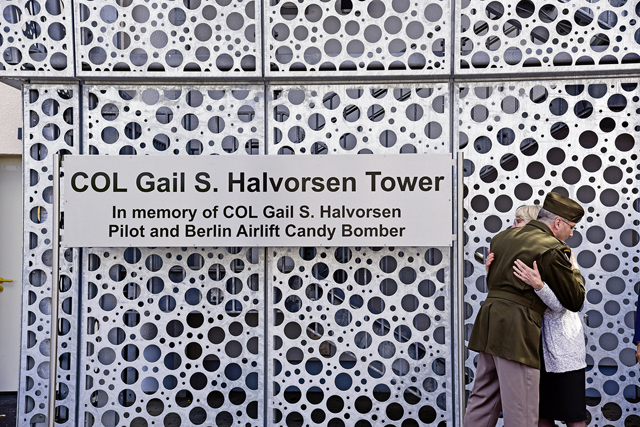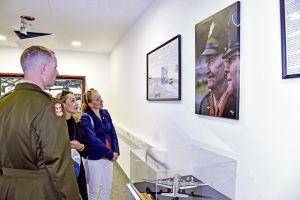
When millions of Germans living in West Berlin were cut off from the rest of the world by a Soviet Union blockade in 1948 it kicked off the Berlin Airlift — the largest humanitarian airlift in history.
One of the heroes of the Berlin Airlift that has stood out over the years was U.S. Air Force airlift pilot Col. Gail S. Halvorsen. In addition to delivering lifesaving supplies like food, fuel and medicine, Halvorsen began dropping candy to lift the spirits of the children and others suffering in West Berlin during the blockade. He started a trend that resulted in 23 tons of chocolate and other candies being delivered during the airlift and has gone down in history as the “Candy Bomber.”
Halvorsen passed in 2022, but one way his legacy will live on will be as the namesake of the new Col. Gail S. Halvorsen Tower dedicated during U.S. Army Garrison’s Berlin Airlift 75th Anniversary celebrations.

Members of the late Halvorsen’s family, Army leaders, project partners and others with direct ties to the Berlin Airlift all gathered for a dedication ceremony that honored his legacy and formally dedicated the recently completed air traffic control tower on the Clay Kaserne portion of U.S. Army Garrison Wiesbaden in his name.
“Halvorson’s actions during the Berlin Airlift became a symbol of humanity and hope for millions around the world,” said Air Traffic Controller Dirk Schulz. “The airlift not only provided hope, but it also symbolized a positive change in the world and laid the foundation of a friendship between two nations who remain close allies to this day.”
Halvorsen’s daughter, Denise Williams, spoke at the ceremony about how touching it was to have the air traffic control tower named in honor of her father, highlighting how much respect and gratitude he had for air traffic controllers from his flying days.
“He wrote in his memoirs about thew Berlin Airlift days. He said ‘What a feeling on a stormy night, when you’re worn to a frazzle, to have a crew like that put you at ease and guide you to the end of the runway. We pray for those guys,’ Williams said. “My dad always had deep respect for those often forgotten heroes in ATC (Air Traffic Control) for their vigilance and assistance in helping him to complete the mission. I heard him speak many times of his respect and gratitude for these great professionals.”
The airfield at Clay Kaserne played a key role in the Berlin Airlift, as one of the main staging points for aircraft to load up supplies and depart for Berlin. The air traffic control tower being replaced was first built soon after the end of the Berlin Airlift — meaning it’s approaching 75 years old.
The new air traffic control tower will provide new, modern facilities to support the management of air traffic in support of U.S. Army Europe and Africa for years to come.
The construction of the new Halvorsen Tower was managed by the U.S. Army Corps of Engineers, Europe District in close partnership with the garrison, U.S. Army Europe and Africa, 1st Battalion 214th Aviation Regiment and German construction administration Bauamt partners.

Europe District Commander Col. Dan Kent built on Schulz’s remarks, noting how Army engineers oversaw the rapid delivery of air infrastructure in Berlin to accommodate the thousands of flights delivering aid there and continue to deliver projects today in Germany.
“Army Engineers oversaw the rapid delivery of air infrastructure that helped make the Berlin Airlift a historic success, but it was the grit and determination of the German people in Berlin that made it a success. In all, German crews put in nearly 10 million labor hours delivering that air infrastructure. Truly amazing determination,” Kent said. “With this project and countless all over Germany we are proud to continue that tradition of partnership and friendship with our indispensable German Bauamt partners to deliver facilities contributing to regional security and operational capabilities.”
U.S. Army Garrison Wiesbaden Commander Col. David Mayfield remarked how the tower not only paid homage to Halvorsen and all those involved in the Berlin Airlift, but also how it was a symbol of the continued commitments and relationships that date back to the airlift.
“This tower is a significant addition to our installation as we honor the bravery and the resolute commitment of everyone involved, and their sacrifice, during the Berlin Airlift 75 years ago, Mayfield said. “This steadfast commitment to our allies, our partners and our friends continues to resonate through U.S. forces throughout Europe.”


